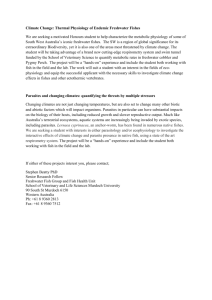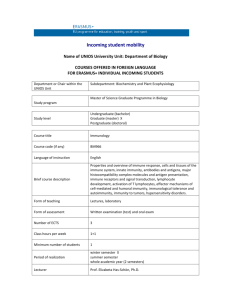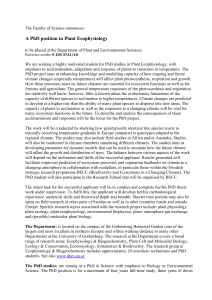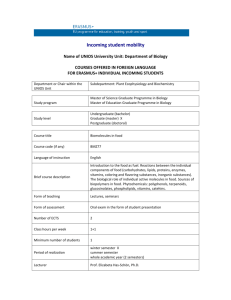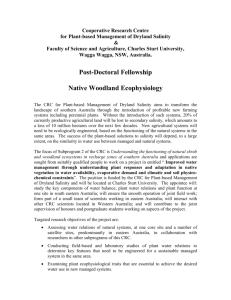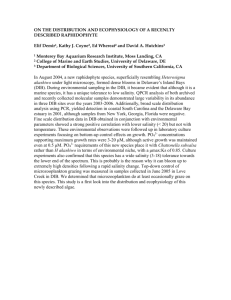Introduction to course and first week assignment
advertisement
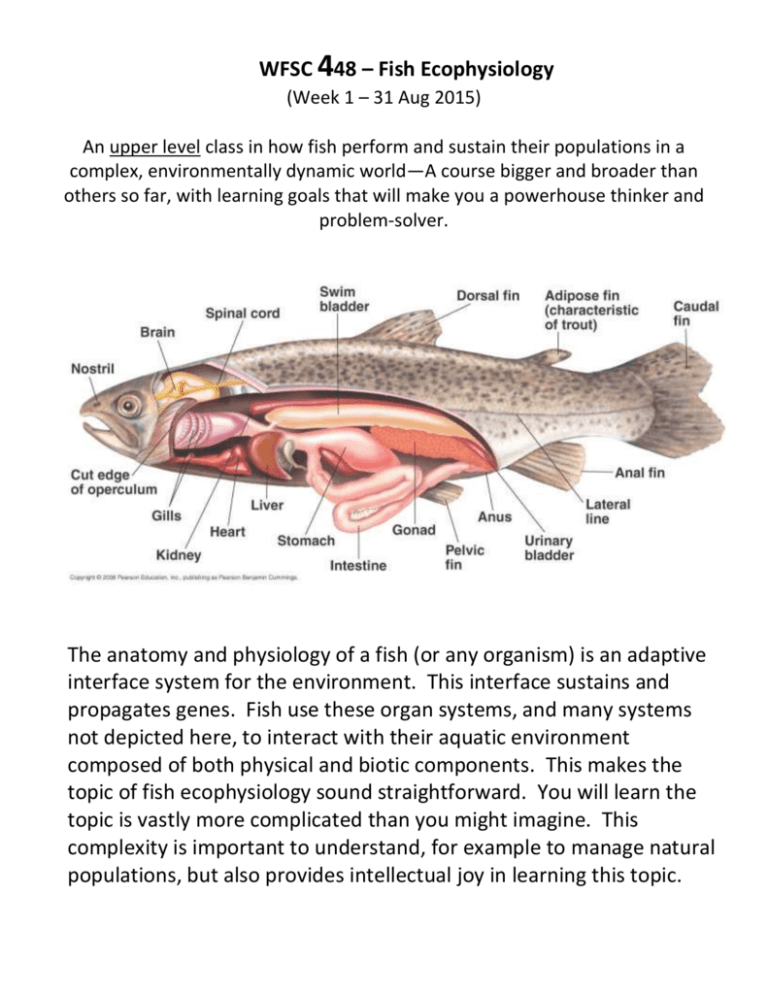
WFSC 448 – Fish Ecophysiology (Week 1 – 31 Aug 2015) An upper level class in how fish perform and sustain their populations in a complex, environmentally dynamic world—A course bigger and broader than others so far, with learning goals that will make you a powerhouse thinker and problem-solver. The anatomy and physiology of a fish (or any organism) is an adaptive interface system for the environment. This interface sustains and propagates genes. Fish use these organ systems, and many systems not depicted here, to interact with their aquatic environment composed of both physical and biotic components. This makes the topic of fish ecophysiology sound straightforward. You will learn the topic is vastly more complicated than you might imagine. This complexity is important to understand, for example to manage natural populations, but also provides intellectual joy in learning this topic. Learning outcomes/goals for course ● Learn to think integratively (build conceptual framework with information from different domains) ● Learn to think creatively (come up with ideas no one else has thought) ● Learn to think thoroughly (carry through logical scenarios to distant yet probable ends) ● Learn to think about connectedness of physiological systems, ecological systems, and physio-eco couplings ● Read a lot of scientific literature (gain facility extracting information; gain information) ● Learn to critically evaluate experimental designs (understand replication within treatments, time frames, dosages, interactions, and power) ● Learn to think quantitatively (e.g. understand statistics, modeling) ● Learn some ecology and physiology of fishes ● Practice preparing an oral presentation ● Practice giving an oral presentation ● Practice participation in scholarly oral discourse ● Spark and feed your sense of wonder about nature Learning how to learn from Dr. DeWitt Descriptive information is boring. Every isolated fact I teach you will be boring. But synthesis is sublime. Memorizing facts is not learning in a very meaningful sense. Learning concepts is deeply meaningful. Learning to reflect, to twist facts and concepts into new syntheses, and reach to new domains is the goal. ● Concept rotation (lateral thinking) ● ● ● ● ● ● ● Concept extension—carrying it through How do we study without a text? ● Lecture notes point to concepts that should be understood ● Primary literature assigned also points to important concepts and provides detail. ● Even my tangents if they have information content are important. ● Rely on the above points to know what detail to learn and fill in your conceptual frameworks with additional material (e.g. Wiki’s, literature you find, etc.). ● Pay attention to cues (literary—underlining and font color in notes; verbal—“you need to know this”, “understand this concept”…) ● External content is important—that is why I provide links in the notes to any external content I use—so you can review the material outside of class. ● Take responsibility for learning the concepts well enough to do something with them—like connect with other concepts. Example questions: From a tangent: “What was the major point of our discussion of the radio-telemetric search for extraterrestrial life via chemical signatures?” a. chemical disequilibrium is a hallmark of the physiology of life b. entropy always wins due to the 2nd law of thermodynamics c. heterogeneity within organisms produces homogeneity without d. manned missions to seek life are ludicrous e. telepathy is the most sensible approach to find ET life Conventional question: “What field of study was created largely to understand evolutionary adaptation?” a. calculus b. statistics c. trigonometry d. biochemistry e. biogeochemistry A strong emphasis in the course is adaptational biology, taken both to mean short term physiological accommodations to the environment and long term evolution. Why this emphasis? ● Evolving fit for the environment has produced the vast diversity of organismal form we see on the tangled bank. ● Evolving fit for the environment has produced the vast diversity of internal systems of control, each coevolved to maintain internal homogeneity and maximize external synergy. Examine syllabus & discuss class structure, grading, etc… Week 1—Intro to topic The linear flow of class I planned was interrupted by my invitation to a National Institute. So…. Release time normally provided later in course will in part be up front, so you can do an independent assignment up front. Concept rotation suggested to me a potential win for all regarding my away time. I wish to conduct an experiment that you all will make successful, resulting in a personal conceptual framework going into the semester about what ecophysiology is, which framework will be ready for expansion and filling in by me as the semester proceeds. TTWYAGTTT,TT,TTWYJTT ● Wednesday 2 Sep – Class released. Use release time on Wednesday for self-directed study/discovery of “ecophysiology” and preparation of slide and brief oration for class on Friday. Slide should provide your synthetic definition of ecophysiology, at least 3 examples of such work from the literature, and have additional elements (perhaps a flowchart?) that help you to convey your grand conception of ecophysiology. You may focus on ecophysiology taken broadly or fish ecophysiology if it helps your narrative. ● Friday—present slides and oration, in reverse alphabetical order based on last names. Questions and comments are encouraged during presentations. After presentations, stare at each other until discussion breaks out regarding the definition and scope and utility of ecophysiology. Explore the topic as fully as possible. A faculty member from Fisheries will be there to assist with AV in the room. This faculty member is there to assist and observe—NOT to run the discussion or event (YOU do that). So, realize this is an experiment in self-assembly and trying to get students at the brink of the class to take ownership and prepare for the semester ahead. ● Labor day—Class released. Please use this time to explore topics for your class projects.
